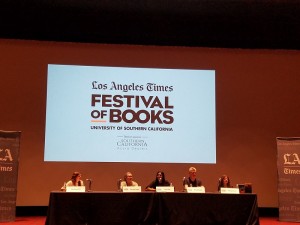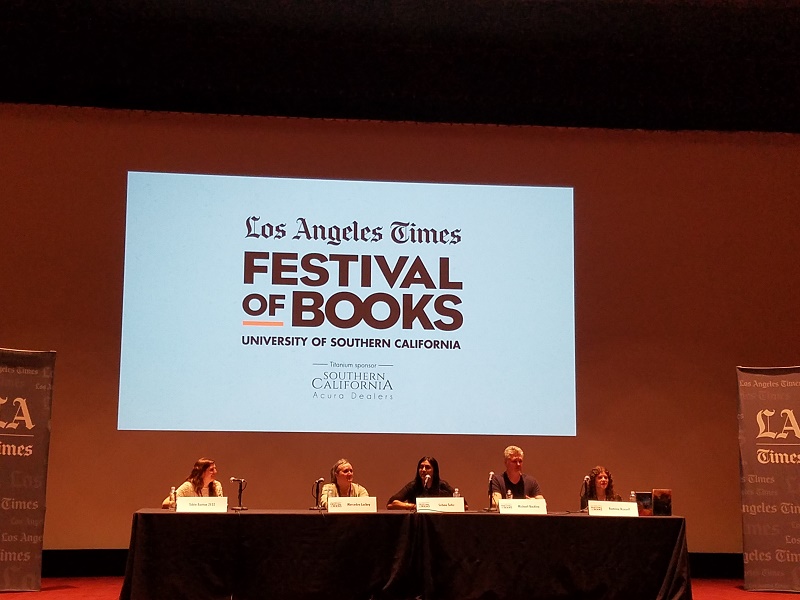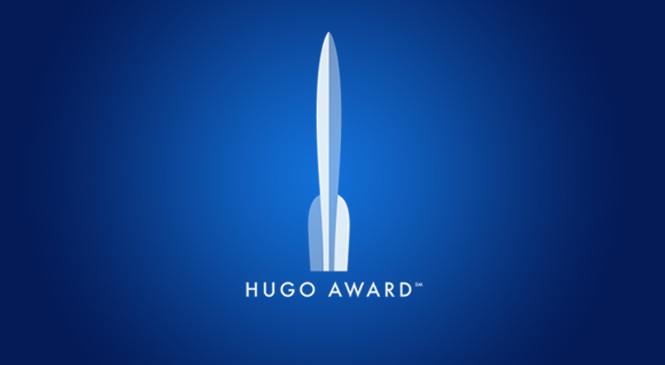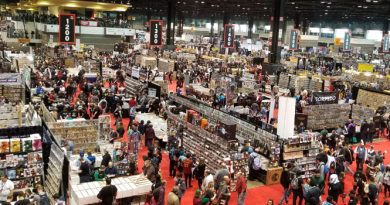YA Fantasy Shines at the LA Times Festival of Books
In an increasingly digitized culture, the two-day Los Angeles Times Festival of Books proves that the written word is still very powerful indeed, especially where young minds are concerned.
The “Young Adult Fantasy: Beyond this Realm” panel packed the Eileen Norris Theater at the University of Southern California on Sunday, as the 21st annual Festival of Books began to wind down. But the energy in the theater was at an all-time high, and support swelled for YA authors and panelists Mercedes Lackey, Sabaa Tahir, Michael Buckley and Romina Russell, as well as for moderator and USC alum Tobie Easton.

The authors immediately struck up an easy rapport, from veteran Lackey, who has written over 100 books to date, to newbie Easton, whose first novel, Emerge, will be released at the end of April. Led by questions from Easton, the group discussed topics such as their unified distaste for Goodreads reviews, their differing methods of world-building, and the importance of diverse representation in literature.
Tahir, best-selling author of An Ember in the Ashes, said she “layers” in the history of her world throughout the writing process, while Buckley, responsible for the Undertow series and the middle-grade series The Sisters Grimm and N.E.R.D.S., bases his world-building on “real places,” and then “[has] fun twisting them up.” Lackey, meanwhile, summed up her thought process as: “What haven’t I done yet?”
Each author also spoke about the ability to explore real-life themes such as religion, government, racism and xenophobia within the realm of science fiction and fantasy. “We sneak in under the radar,” Lackey said. “And this is a good thing— if you’re going to be subversive, you don’t tell anyone about it!”
Russell explained the concept behind her ZODIAC series, in which 12 different races share the same universe but live in different worlds, as being similar to real life, where we share the same planet but live in very different worlds. “It’s that idea of, if we actually got to know each other better and came together under the banner of unity, how much richer our world would be,” she said.
Buckley summed it up more generally: “Throughout fantasy and science fiction writing, even though there might be spaceships or dragons, it’s always about what it means to be a human being.”
How did each author end up composing “spaceship or dragon” narratives in the first place? Lackey’s father influenced her science fiction obsession, but her parents encouraged her to read any and all types of fiction. “I first picked up a science fiction book called Agent of Vega that I absolutely adored, and after that, every bit of my allowance went towards books,” Lackey said. “Well, that and Beatles magazines!”
Tahir noted that her parents took a different approach than Lackey’s. “My parents were like, ‘Why are you reading when you should be studying?’” she said. “I was definitely a ‘flashlight-under-the-blankets’ kid.” And on a more serious note, she continued, “I turned to fantasy as an escape. I grew up in this really small town, and it was super racist.”
Tahir, for one, has found comfort in the YA fantasy community. When Easton asked the group about their transitions from “fantasy reader” to “fantasy author,” each one praised the welcoming support of fellow YA writers.
“I absolutely love the YA community,” Tahir enthused. “I was bowled over by how welcoming everyone was.” She admitted to doing a lot of “internal fangirling” whenever she comes in contact with authors she admires (a list that includes fellow panelist Mercedes Lackey), a sentiment echoed by Buckley. “The great thing about this job is that you do get to rub elbows with your heroes— and they’ve been amazing.”
Lackey pointed to the genre itself as a starting point for acceptance. “Science fiction and fantasy have always been that way,” she noted, “probably because science fiction and fantasy fans— going back to the ‘30s— have always been the nerds, they’ve always been the outcasts, and it’s always been the case that when you found another person that read the same crazy stuff, you’d go, ‘Oh my God, my long lost brother!’”
That’s a notion any fantasy or science fiction fan can appreciate.
Find out more at http://events.latimes.com/festivalofbooks/.




